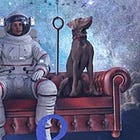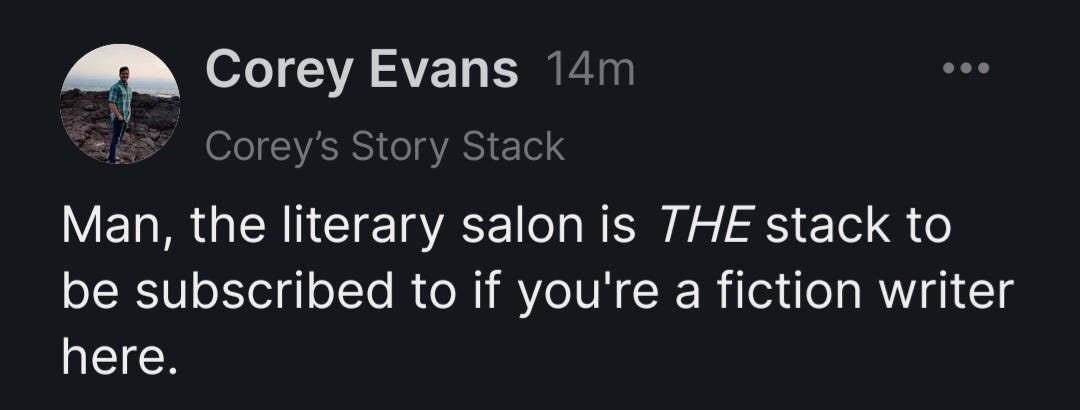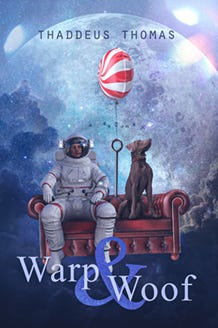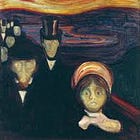Paid Subscribers: this is your invitation to the Literary Salon Slack, a communication space that will help our various author initiatives as well as our shared readings.
Not a paid subscriber? The current discount is a bargain!
Warp and woof (warp and weft): (from dictionary.com) The essential foundation or base of any structure or organization; from weaving, in which the warp — the threads that run lengthwise — and the woof — the threads that run across — make up the fabric.
Before we begin:
How to Manage Your Account
Every Newsletter has a toggle. Toggle on the ones you want to receive and toggle off the ones you don't.
To choose which series come to your inbox, click on:
https://literarysalon.thaddeusthomas.com/account
…and if you are a writer?
The news tab is a great place to start.
Grab a Free Book from our Bookmotion promotion:
Not yet subscribed to Literary Salon?
I’m currently offering a special, and you’ll keep that discount for as long as your hold the subscription.
Now let’s read Chapter 10.
Warp & Woof
Chapter Ten:
Pодной Mир / Cтрелки
(Rodnoy Mir / The Strelki)
Warp
Each time Warp woke, memories flitted from his mind like birds from a cage. He lay in his bed, searching for something that had been there just a moment before, and this time, something stuck. He saw Laika when she was newborn, still being bottle-fed, and he remembered the day Dr. Popov brought her to him.
The head of the department wanted to handle the weaning himself, but after his mom’s death, Popov knew the time had come. Warp held the little mewing creature to his face, and both man and dog grew calm. Popov arranged for him to have unlimited access to the green space—a privilege so grand in its scope, he almost couldn’t believe she’d pulled it off—and Popov took advantage of it by moving his sessions there, which granted her green time without having it deducted from her allotment. She said Command had denied requests for extended allotments for the other survivors; the extra time was for Laika’s benefit, not Warp’s.
“Everyone loves a dog.”
Laika was nearly full-grown when Popov’s tests proved the survivors would suffer the same end as his mother. It would come slower, but there was no cure. Even if she put them all in suspended animation, when they awoke their fate would be the same, granted only the reprieve of the time they’d been under.
She notified Command, and they called her to the bridge. No one but bridge personnel and Command ever went to the bridge.
“It’s a great honor,” Warp said.
The look on Popov’s face suggested she didn’t agree. Not every invitation could be trusted. Sometimes, cruelty masquerades as honor. Sometimes, the invitation to dinner puts you in the pot.
He remembered their descent into the planet’s atmosphere. Weightlessness had been the first freedom sacrificed, and Lazorevka shook at the atmosphere’s rebuke. In the north, a near-endless herd parted, fled, and regathered in the wake of their passing, and Warp saw in its movements the pattern of the murmuration he’d later see at the beach.
Storm clouds threatened the west. Waters covered the east, but the hungry grass lay broad, flat, and peaceful.
They pulled the ship into a broad circle, passing over the cliffs and the ocean’s white-capped waves. A sleek behemoth rose from the deep, chasing a school of fish that parted, fled, and regathered in the creature’s wake. Within the heart of the planet’s diversity, Warp saw a uniformity of behavior, like a shared programming, and the thought troubled him.
He heard the ship power down and unstrapped himself from the chair, pausing to listen to the descending hum. Against the complaints of muscles and joints, he stood. He felt the pressure of the world’s pull in every atom, and he took a moment, in stillness, to be present and appreciate the sensation, before he walked out of his compartment and down the corridor.
The bay door opened. Zasha joined him, and they stepped out into a wind that beat without purpose at a brown and shriveled field, already leveled flat. Warp braced himself against the cold as flurries of snow swirled and danced, as if signaling some forgotten code. He looked back into the warm confines of the ship. This wasn’t right. He wasn’t remembering things as they had been.
Zasha took his hand. “Find me.”
When he turned, she was gone. He called for her, and when she didn’t return, he climbed into a suit. Being unpracticed with the helmet and unable to secure it to his collar, he left it behind. The suit alone would have to protect him from the cold and whatever else awaited.
Starlight glowed in the phantasmal air, both dazzling and reminiscent of the great lights of each Strela’s agricultural core. The snow gathered at his collar, melting until too much gathered, insulated itself, and froze the meltwater against his skin. He brushed it away like an insect. The sting remained.
Not so long ago, he’d been in a place when the grass was vibrant and verdant, and in that grass, he’d dreamed. He’d flown through the Strela’s core by running off the raised end of the tube, and in reality there was a hair’s breadth of possibility, a pocket at the center line where the rotation of the ship had no effect. Had he managed to reach it and floated free, he still couldn’t have skimmed over the cornfields and reservoirs; that was mere fancy. Nor could he have climbed the end of the tube. The blistering heat of the lights would have turned him away.
Memory lost detail to the emotional need of the dream. Ahead, he could barely see Zasha’s dark form trudging through the snow. He knew all of this to be an oneiric divergence from remembered truth, and still he chased after her. Emotional need demanded it. This was not real nor was it memory. Life was but a dream, his mother’s final fear.
Still she haunts me, phantomwise,
Alice moving under skies
Never seen by waking eyes.
Lewis Caroll. Life is But a Dream.
Of all the poetry his mother read him in his youth, these lines came back to him now, a warning from long ago that the reality of this experience was purely subjective. Eventually, reality broke for everyone, and falling asleep was, perhaps, to awaken from this dream, one transitional state blending into another, all things shifting sideways.
His earliest memory was of his mother protecting him, no matter the harm that came to her in his stead. Was this moment plucked from a newly minted mind a mere subjective illusion, unreal and slouching toward an eternal oblivion?
The memory was of her standing up to his father. He hid behind her legs as she defended him and was knocked to the ground when she fell. His father towered over them. Even now his father’s rage remained clear and detailed, but his mother never stopped fighting back. She’d taught by example. Never quit simply because you’re afraid, not even in this uncertain space.
Snow covered everything by the time the shadow appeared in the distance. As the shadow grew, the snow rose to his ankles. The shadow took form, a train station standing alone in a field of white. He climbed the stairs, and a distant whistle blew. The train came, black in a billowing white of snow and steam. It groaned mechanically and cried itself to a stop, and in the huffing silence that followed, he heard Laika’s tender whimpers, urging him onboard.
#
Warp awoke as the train whistled to a stop at another small, snow-covered platform. Flurries swirled through the air like a murmuration of starlings. A porter opened the compartment door, and as Warp stumbled out. He looked back, as if expecting Laika to run free from the baggage car. No one came.
“She’s waiting for you at the estate,” the porter promised.
Warp wanted to argue that Laika had been on the train and could not possibly already be at his destination, but as soon as the question rose in his mind, the answer settled in his heart. When he arrived, she would be waiting.
He climbed into a horse-driven carriage. It felt familiar. “Russian Winter,” he whispered
With the tiniest lurch, the carriage carried them down a lane, past the country estates of old families where farmlands surrounded towering homes, straight and severe against a landscape draped in virginal white.
The carriage left him at an estate painted blue with white trim, seeming little more than an illusion against the morning snow. Inside, Warp suspected he’d find more blue walls with more white trim until the color motif took over the furniture as well, and everything became weightless and irrelevant.
In the distance, a hunter trudged through drifts, and Warp turned and followed her into the fields. The hunter walked with the butt of her rifle cradled in the crook of her arm and the muzzle aimed to the earth. Warp was close enough now to recognize her, and he almost called out when other sounds silenced him.
A dog’s bark was followed by a train’s whistle. Zasha stopped, shielded herself against the wind and snow, and listened. She took aim at the low and empty sky. The dog sounded again. Birds bolted from hiding, and Zasha fired.
Warp drew closer, and she spoke to him without looking back. “When my people left their home, they built a place much like this, like it, but not precisely the same. This, I inherited from another people. They lived here for as long as life retained its allure, and then they willed themselves away.”
Laika trotted to them with two birds in her mouth, a single wing outspread and askew, and Warp’s heart cried out in silent revulsion. He’d never trained Laika to be a hunter. With her tail wagging, she dropped the birds at Zasha’s feet and then, at her command, tore off again through the brush.
The train whistled, and this time Warp saw the trailing cloud of steam and the tracks which emerged from the woods and stretched out across the plain in their direction.
“Is any of this real?” he asked.
“That’s not the question you need to answer.”
“It would seem to be the only question that matters,” he said.
“You’re progressing slowly, and the others haven't even started. I can’t do this by myself.”
“Are we all just figments of your dream?”
“This world was meant to be a societal effort. Stop worrying about what’s real and start asking yourself what’s right.”
Laika’s cry sounded from across the tracks. The train drew closer. A flock of birds filled the sky, but Zasha didn’t take aim.
“I don’t understand,” he said, louder now, to be heard over the approaching train.
The wind howled an eerie, mournful cry.
“Not everything’s about what you know,” she said. “Sometimes the most important things are felt.”
Zasha stood at the tracks’ edge; the train plowed through snow in its labored approach. She called Warp to her, drew up his collar in her gloved fist and pulled his ear to her lips.
“Sometimes, we have to step out of the way. I believe in you, Warp. You’ll find your path. Our lives depend on it.”
She struck him in the chest, and he stumbled backward into the snow. Zasha fell onto the tracks.
The winter wind and the passing train blended together, screaming in shared horror at the violence and human debris; blood crystallized into frozen rain and marred the field’s winter blanket with shards of garnet. Warp lay where he fell and stared, startled and mute, and in a place beneath human language, he told himself he was dead, as all life seeks death. The cry in his heart roared like the train, deafening him from within. Woodcock feathers tumbled in the turbulence.
— Thaddeus Thomas
Visit the Literary Salon bookstore:
Fresh Flash Fiction for Paid Subscribers—these won’t be emailed to you, but you’ll find the link in my regular posts. I’ll experiment this week with offering a new story with every post:







